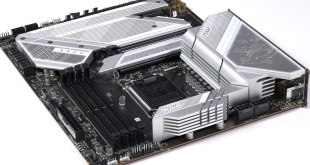Intel Corp.’s next-generation 9 core-logic sets may not be packed with loads of innovations, but they still feature technologies not available on today’s platforms. Among those are support for higher-performing storage devices and improved security.
Intel 9-series chipsets – Z97 and H97 – are expected to be shipped sometime in the second quarter of this year, a source with knowledge of Intel plans told KitGuru. The new core-logic sets will support microprocessors that belong to the Haswell, Haswell Refresh and, potentially, Broadwell families as well as several new technologies not available today. Mainboards based on the new chipsets will be exposed at Computex Taipei 2014 trade-show in early June.
Just like existing 8-series Intel chipsets, the new 9-series core-logic sets – Z97 and H97 – will support various microprocessors in LGA 1150 form-factor as well as general functions found on today’s platforms. Expect Intel 9-series chipsets to support six Serial ATA-6Gb/s ports, 14 USB ports (with up to six ports in USB 3.0 mode), PCI Express 3.0 x16 (via CPU, reconfigurable in case of Z97), PCI Express 2.0 x8 and so on.
There are three noteworthy improvements: support for solid-state drives in PCIe M.2 form-factor (PCI Express 2.0 x2 interface with up to 1GB/s maximum bandwidth), Intel device protection with boot guard technology as well as Intel Rapid Storage technology with support for PCI Express-based storage drives.
Although Intel decided not to enable support for SATA Express interface – next-generation interconnection technology for storage devices (solid-state drives, hard disk drives, etc.) that uses standard SATA connector and PCI Express protocol with up to 2GB/s maximum bandwidth – on its 9-series chipsets, it still implemented support for PCIe M.2 SSDs to boost storage performance. Even 1GB/s maximum interface bandwidth is considerably higher than up to 600MB/s provided by Serial ATA-6Gb/s, thus, performance enthusiasts this year will use PCIe M.2 SSDs. The new platforms will also support Intel Rapid Storage tech for M.2 PCIe SSDs, which will allow to create hybrid storage solutions (consisting of a hard drive and an M.2 PCIe solid-state drive) based on the latest chipsets.
Intel’s 9-series chipsets will also bring support for Intel Device Protection technology with Boot Guard, which will boost security of personal computers based on the latest desktop and notebook platforms from Intel. The technology was developed by Intel Security division and is a combination of hardware and software. This will be the first time for Intel consumer core-logic sets to feature an advanced security technology.
Traditionally, Intel’s Z-series chipset (Z97) will support overclocking of microprocessors as well as Intel Dynamic Storage Accelerator. The H-series core-logic (H97) will not support overclocking/performance tweaking knobs, but will feature Small Business Advantage platform tech.
It is noteworthy that Intel Z97 and Intel H97 chipsets will be the only 9-series core-logic for desktops this year. Since 8-series chipsets will support Haswell Refresh processors, which will be Intel’s mass solutions for client desktop PCs this year, it hardly makes sense to introduce all-new chipsets for them.
Intel did not comment on the news-story.
KitGuru Says: The most important feature of Intel Z97 and H97 platforms is clearly the support for PCIe M.2 solid-state drives with up to 1GB/s of bandwidth. This will help to realize the full potential of modern SSDs and boost performance and responsiveness of forthcoming personal computers. Still, one or two innovations compared to previous-generation chipsets clearly point to a very slow progress of desktops in general these days.
 KitGuru KitGuru.net – Tech News | Hardware News | Hardware Reviews | IOS | Mobile | Gaming | Graphics Cards
KitGuru KitGuru.net – Tech News | Hardware News | Hardware Reviews | IOS | Mobile | Gaming | Graphics Cards



